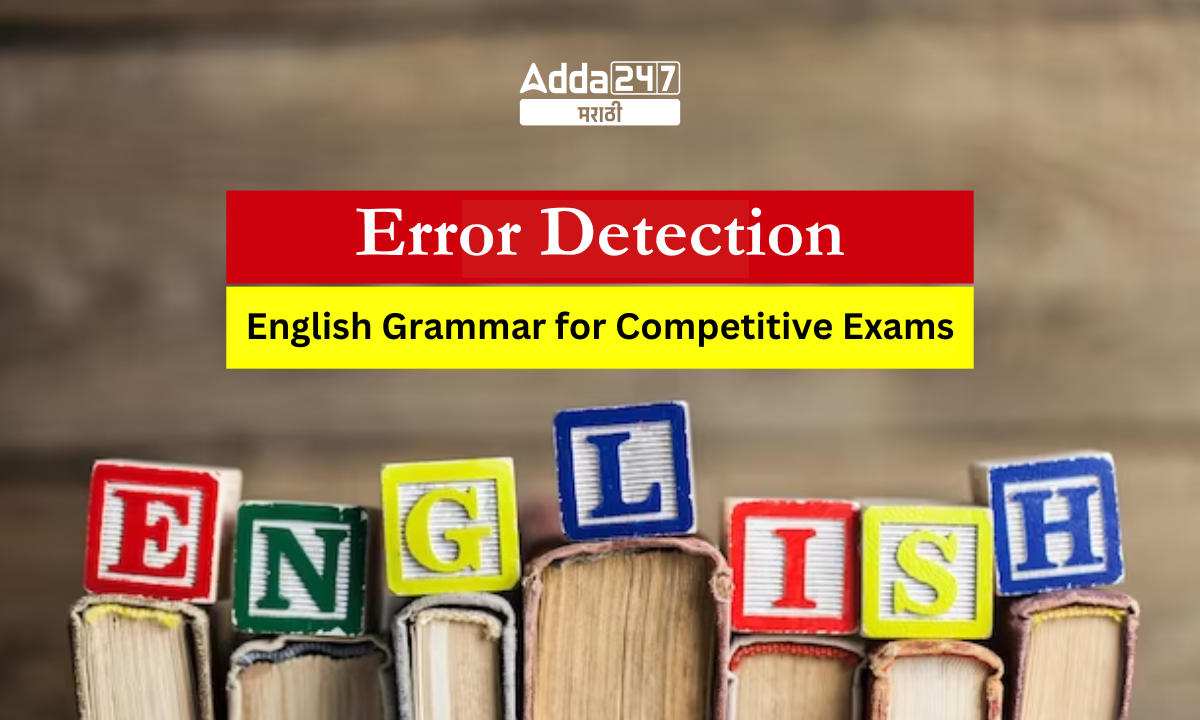Table of Contents
Error Detection
Error Detection: महाराष्ट्रातील तसेच राज्यातील बहुतेक स्पर्धा परीक्षेचा महत्वाचा विषय म्हणजे इंग्लिश. इंग्लिश विषयात जास्तकरून इंग्लिश ग्रामर वर प्रश्न विचारले जातात. नेहमीच्या सरावाने इंग्लिश विषयात चांगले गुण मिळू शकतात. आगामी काळातील सरळसेवा भरती जसे की, जिल्हा न्यायालय भरती आणि इतर स्पर्धा परीक्षांमध्ये इंग्लिश ग्रामरला विशेष महत्त्व आहे. इंग्लिश ग्रामर चे रोज वाचन फायदेशीर ठरते. इंग्लिश ग्रामर मधील एक महत्वपूर्ण घटक म्हणजे Error Detection. यावर परीक्षेत हमखास 1 ते 2 प्रश्न विचारले जाऊ शकतात. या लेखात आपण Error Detection व त्यातील महत्वाचे नियम यावर माहिती पाहणार आहोत.
Error Detection: विहंगावलोकन
इंग्रजी व्याकरणाचा अभ्यास करतांना Error Detection या घटकाचा अभ्यास करणे महत्वाचे ठरते. या लेखात Error Detection बद्दल सविस्तर माहिती दिली आहे.
| Error Detection: विहंगावलोकन | |
| श्रेणी | अभ्यास साहित्य |
| उपयोगिता | जिल्हा न्यायालय भरती आणि इतर सर्व स्पर्धा परीक्षांसाठी उपयुक्त |
| विषय | इंग्रजी व्याकरण |
| लेखाचे नाव | Error Detection |
| लेखातील प्रमुख मुद्दे |
|
Error Detection
Error detection questions have always been an integral part of English section and whether it is pre or mains it always finds its place in the examination. Error detection questions were also not safe in this total makeover of the English section as the style of the questioning and its format was totally changed. Earlier you had to find the error in one part of the sentence but now five sentences are given and you have to choose the one which is error free. There can be questions in which five different ways of writing a sentence are given and you have to choose the one which is most appropriate and logical or there can be questions in which five different sentences are given and you have to choose the one which is most appropriate or error free. The preparation process is same, you have to go through the grammar section and you need to practice as much as you can but the process of answering the question is very lengthy and takes a lot of time. You can speed up the process only if you have practiced enough for the new pattern questions. We are providing you some sample questions on various formats so that you can prepare yourself for these questions accordingly.
Practice Questions Based on Latest Pattern
Directions (1-9): In each of the questions below, four sentences are given out of which only one is grammatically correct and has the most appropriate structure. If none follows choose (e) as your choice.
1. (a) Recognising entertainment as an important factor in improving mental and physical health and thereby reducing human misery and poverty.
(b) Entertainment being recognised as an important factor in improving mental and physical health and thereby reducing human misery and poverty.
(c) Recognition of it being an important factor in improving mental and physical health entertainment reduces human misery and poverty.
(d) Entertainment is recognised as an important factor in improving mental and physical health and thereby reducing human misery and poverty.
(e) None of these.
2. (a) To be sure, there would be scarcely any time left for other things if working people should be expected to have considered all sides of every matter on which they had opinion.
(b) There would be scarcely no time left over for other things if working people would have been expected to have considered all sides of every matter on which they had opinions.
(c) To be sure, there would be scarcely no time left over for other things if school children will be expected to have been considering all sides of every matter on which they had opinions.
(d) To be sure, there would be scarcely no time left over for other thing if school children will be expected to have been considering all sides of every matter on which they had opinions.
(e) None of these.
3.(a) Unless present policies are reversed immediately, the world may suffer irreversible damage from the unregulated use of Bioweapons.
(b) Unless they reverse present policies immediately, the world may suffer irreversible damage from the unregulated use of Bioweapons.
(c) Unless present policy are reversed, the world may suffer irreversible damage through the unregulated use of Bioweapons.
(d) Unless present policies are reversed, the world may suffer irreversible damage through the unregulated use of Bioweapons.
(e) None of these.
4. (a) The main problem with the nation of price discrimination is that it is not always a bad thing, but that it is the monopolist who has the power to decide who is charged what price.
(b) The main problem with the notion of price discrimination is not that it is always a bad thing; it is the monopolist who has the power to decide who is charged what price.
(c) The main problem with the notion of price discrimination is not that it is always a bad thing, but that it is monopolist who has the power to decide who is charged what price.
(d) The main problem with the notion of price discrimination is not it is always a bad thing but that it is the monopolist who has the power to decided who is charged what price.
(e) None of these.
5. (a) A symbiotic relationship develops among the contractors, bureaucracy and the politicians and by a large number of device costs are artificially escalated and black money is generated by underhand deals.
(b) A symbiotic relationship develops among contractors, bureaucracy and politicians, and costs are artificially escalated with a large number of devices and black money is generated through underhand deals.
(c) A symbiotic relationship develops among contractors, bureaucracy and the politicians and by a large number of devices costs are artificially escalated and black money is generated on underhand deals.
(d) A symbiotic relationship develops among the contractors, bureaucracy and politicians, and by large number of devices costs are artificially escalated and black money is generated by underhand deals.
(e) None of these.
6. (a) Beside the impassioned and objective search for truth, science also has the responsibility of keeping the truth inviolate and uncorrupted.
(b) Besides the impassioned and objective search of truth, science has also the responsibility of keeping the truth inviolate and uncorrupted.
(c) Besides the impassioned and objective search for truth, science also has the responsibility of keeping the truth inviolate and uncorrupted.
(d) Beside the impassioned and objective search for truth, science has the responsibility of also keeping the truth inviolate and uncorrupted.
(e) None of these
7. (a) Just as the conceptions of heredity among educated people have not caught on with the facts and theories of today’s genetics, so also most of us tend to cling to vague notion about straight-line evolution.
(b) Just as the conceptions of heredity among educated people had not yet caught up the facts and theories of today’s genetics, so also most of us tend to cling to vague notions about straight-line evolution.
(c) Just like the conceptions of heredity among educated people have not yet caught up with the facts and theories of today’s genetics, so also most of us tend to cling to vague notions about straight-line evolution.
(d) Just as the conceptions of heredity among educated people have not yet caught up with the facts and theories of today’s genetics, so also most of us tend to cling to vague notions about straight- line evolution.
(e) None of these.
8. (a) When we see two people with different social traditions respond in different ways to what appears to the outsider to be identical stimulus situations, we realize that experience is much less an objective absolute than we thought.
(b) When we see two people with different social traditions respond in different ways to what appear to the outsider to be identical stimulus situations, we realize that experience is much less an objective absolute than we thought.
(c) When we see two people with different social traditions respond in a different way to what appear to the outsider to be identical stimulus situations, we realize that experience is much less objective absolute than we thought.
(d) When we see two people with different social traditions respond in different ways to what appears to the outsider to be identical stimulus situations, we will realize that experience is much less an objective absolute than we thought.
(e) None of these
9. (a) Just as a too rapid pace of culture change brings about apathy or hostility or self-destruction so sudden technical innovations lead to vast social erosion within one society.
(b) Just as a too rapid pace of culture change brings forward apathy or hostility or self-destruction, so sudden technical innovations lead to vast social erosion within one society.
(c) Just as a too rapid pace of culture change brings around apathy or hostility or self-destruction, sudden technical innovations leads to vast social erosion within one society.
(d) Just as a too rapid pace of culture change brings in apathy or hostility or self-destruction, sudden technical innovations lead to vast social erosion within one society.
(e) None of these
महाराष्ट्रातील सर्व स्पर्धा परीक्षांसाठी ऑनलाईन क्लास, व्हिडिओ कोर्स, टेस्ट सिरीज, पुस्तके आणि इतर अभ्यास साहित्य खाली दिलेल्या लिंक वर क्लिक करून मिळावा.
अड्डा 247 मराठी अँप | अड्डा 247 मराठी टेलिग्राम ग्रुप









